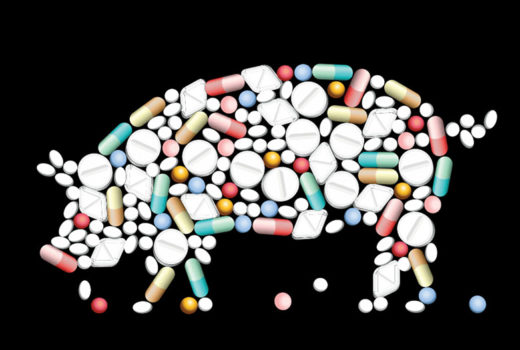The growth in intensive confinement of animals in agriculture has led to a resulting increase in the use of non-therapeutic antibiotics to prevent disease in such overcrowded conditions. Help us kick off Antibiotic Awareness Week by joining us for a panel event that will explore how research, collaboration, and policy can encourage better antibiotic stewardship in animal agriculture and human health care.
Event Overview
In the U.S. alone, 80 percent of all antibiotics sold are now fed to livestock. This broad misuse of antibiotics is partially responsible for the emergence of drug-resistant bacteria that are pathogenic to humans, easily transmitted to humans via food chains, and widely disseminated in the environment via animal wastes. These challenges are of local, national, regional, and international significance, as there are no geographic boundaries to impede the spread of antibiotic resistance.
Panelists:
Andrew Jacobs
Lead Health and Science Reporter, New York Times
Andrew Jacobs is a reporter with the Health and Science desk at the New York Times and previously was based in Beijing and Brazil. His reporting for The Times has included such varied topics as the presidential campaign, the aftermath of the earthquake in China and the lead up to the 2008 Summer Olympics. His other passions include gentleman farming and landscaping design (activities which take place on a 135-acre farm in the Catskills). A native of New Jersey, Mr. Jacobs graduated in 1984 from New York University, where he majored in architectural history and urban design.
Chris Oliviero
General Manager, Niman Ranch
Chris Oliviero is the General Manager of leading natural meat brand Niman Ranch, a community of 750 independent family farmers raising their livestock sustainably and humanely with no antibiotics—ever. Chris came to Niman Ranch after serving a dozen years with Perdue, helping develop and oversee several of the company’s mission priorities including their trailblazing transition to no antibiotics ever, environmental sustainability strategy and the growth of their organic product line.
Dr. Payal Patel
Infectious Disease Specialist, University of Michigan
Payal Patel, M.D., M.P.H., is an assistant professor in the division of infectious diseases at the University of Michigan and the medical director of antimicrobial stewardship at the VA Ann Arbor Healthcare System, where she leads a diagnostic stewardship effort to reduce ordering unnecessary urine cultures. She most recently served as the antimicrobial stewardship lead for CDC’s States Targeting Reduction in Infections via Engagement (STRIVE) program that sought to reduce health care-associated infections in 443 hospitals in 28 states. She is also working with antimicrobial stewardship programs in Italy, India and Japan.
Sydney Riess
Public Health Campaign Associate, U.S. PIRG
Sydney Riess works as the Public Health Campaign Associate for U.S. PIRG. Carrying on their six-year campaign against the overuse of antibiotics in livestock, she serves as a voice for the public interest. She works to amplify the expertise of the healthcare community and promote the judicious use of antibiotics in healthcare, legislation, and corporate policy.
Kezia Smithe
ESG Analyst, FAIRR Initiative
Kezia Smithe is an ESG analyst at the FAIRR Initiative, focusing on AMR and antibiotic stewardship, and sustainable protein supply chains. She is currently working on FAIRR’s first-of-a-kind report on the animal health sector and its role in driving responsible antibiotic use, including mapping the global portfolios of leading animal health companies to understand the distribution and marketing of antimicrobials that are critically important to human health. Prior to joining FAIRR, Kezia studied at the University of Oxford and worked as a management consultant.
Nicole Negowetti
Clinical Instructor
Nicole Negowetti is the Clinical Instructor at the Harvard Animal Law & Policy Clinic where her teaching and research focuses on food law and policy, agricultural law, and sustainability. Prior to joining ALPC, Nicole was a Clinical Instructor at the HLS Food Law and Policy Clinic and the Policy Director at the Good Food Institute. Nicole currently serves on the Food & Drug Law Journal Editorial Advisory Board and is a founding member of the Academy of Food Law & Policy.

